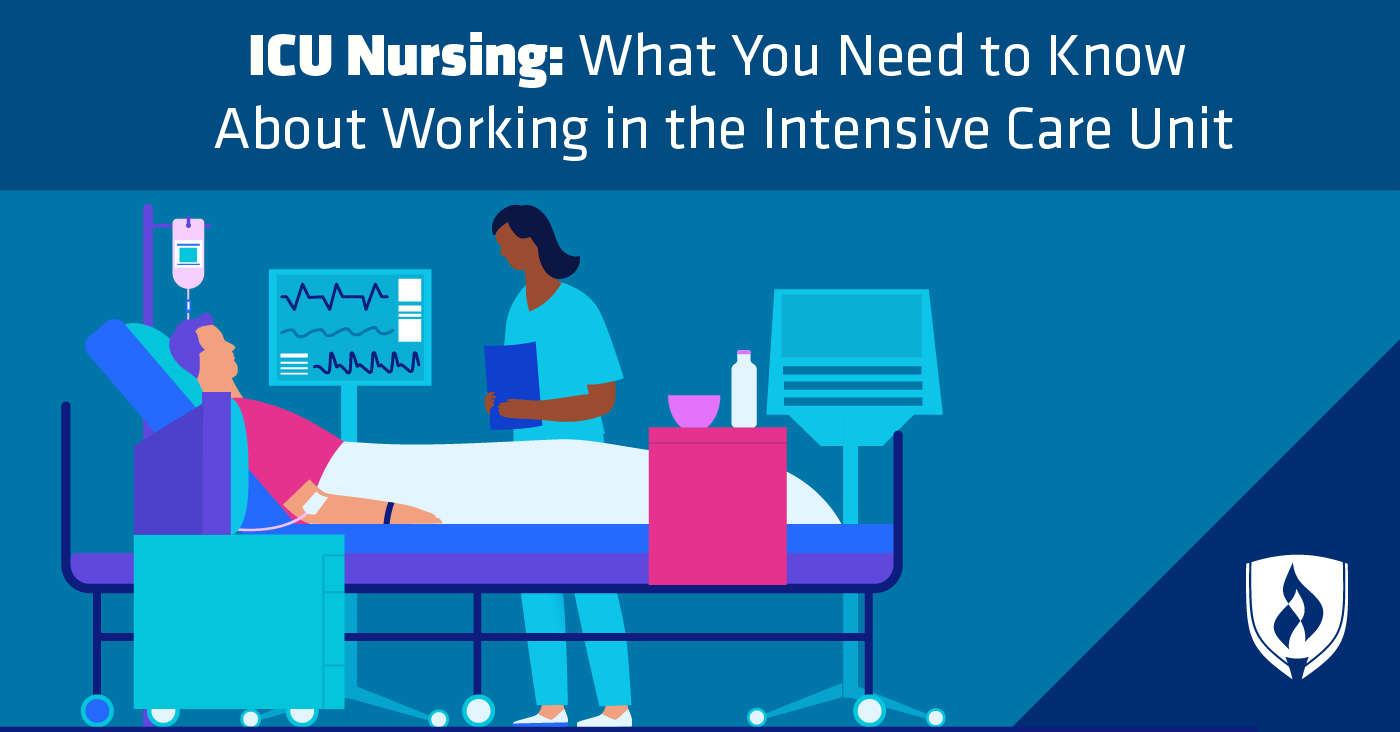ICU Nursing: What You Need to Know About Working in the Intensive Care Unit
By Hannah Meinke on 12/09/2019

It's easy to respect someone who is strong and independent, but it takes a special kind of person to give dignity to those who cannot return the favor—those who are helpless. If you’ve ever been to the ICU, you know that the good nurses working there are a different breed. Not only are they calm under pressure, but they can see beyond a patient’s weakness to the person underneath who has a family, a life, hobbies and goals. If you can share that sentiment, then the ICU needs more people like you.
Like all fields in nursing, the ICU has its challenges and rewards. If you are considering becoming an intensive care unit nurse, you probably have a lot of questions. We’ve done the research so you can be confident in your decision. We’ll cover what ICU nurses do, their skills, and typical patients, but first—what exactly is the ICU?
Get Your Nursing School Questions Answered at a Nursing Information Session
What is the intensive care unit?
An intensive care unit (sometimes called intensive therapy or critical care unit) is a 24-hour, critical care facility usually located in a hospital. This unit is reserved for some of the most vulnerable patients in a healthcare system—those who are critically ill and need close supervision in case their condition rapidly takes a turn for the worse. The ICU is often the next step for patients who’ve made a (justified) trip to the emergency room after the ER team determines they’ve stabilized enough to move on.
One major difference in this unit for nurses is the nurse to patient ratio—typically ICU units strive for one to two patients per nurse. This might seem like a big swing when compared to nursing units or specialties that care for five or more patients at a time, but remember ICU nurses need to check in on their patients much more often due to the level of care required and the seriousness of their conditions.
Some ICUs specialize in certain areas such as pediatric, cardiac or trauma care, but many serve a general purpose. Occupational, respiratory, and physical therapists, dieticians, doctors, and nurses all collaborate in these units in pursuit of a successful patient recovery.
What do ICU nurses do?
Like other nurses, ICU nurses monitor patients, administer medications, assist patients with basic needs, chart care and respond to emergencies. Unlike some other nurses, their patients are often intubated, ventilated, and have multiple IV drips at a time. They must know the ins and outs of a lot more equipment than nurses who practice in a lower-stakes environment.
They must also chart a lot more to keep up with the intensive monitoring, assessments and equipment. Though they have fewer patients, they may have two or three times more documentation per patient—and keeping that information accurate is critical when passing the patient along to the next shift’s nurse.
It’s a good thing though because those charts are what help these nurses stay organized. They must coordinate dozens of medications and treatments, adapting as the patient improves or worsens. ICU nurses need to stay organized—emergency situations can pop up fairly frequently, and often right when you’re in the middle of making your rounds.
Another thing ICU nurses do is interact with patient families. Understandably, many of them are distraught. Not only is their family member significantly ill or injured, but potentially unresponsive, hooked up to lots of machines, and surrounded by a lot of different medical professionals. As an ICU nurse, it is important to reassure families while still being realistic.
What are some common conditions ICU nurses treat?
The kind of patients you take care of will determine a lot about your experience as a nurse. After all, moms in labor, a grandma in hospice, and the kid who broke his leg on the playground are all really different patients.
If you want to work in the ICU, your patients will be different still. You know they’ll be in critical condition, but before nursing school, it’s hard to really know what to expect. Below are a few of the most common conditions you will treat in the ICU:1
- Post-operative. This is the most common kind of patient in the ICU. Patients who have just received open-heart surgery or had an organ transplant need close monitoring during their recovery.
- Trauma. Patients may be transferred from the emergency room after a car accident, assault or shooting. They may have multiple complications including traumatic brain injury or shock.
- Infection. Dangerous infections such as sepsis can cause a variety of life-threatening complications and require an extremely sanitary and closely-monitored environment to recover.
- Stroke. In addition to post-operative care, stroke patients will need diagnostic imaging and physical therapy.
- Cancer. Cancer patients may need to be admitted for recovery after intensive chemotherapy, an unexpected infection or transplant surgery.
- Ruptured brain aneurysm. Controlling a patient’s blood pressure may sound like a simple task, but in a case like this, even the smallest fluctuation could cause more bleeding.
What skills do ICU nurses need?
We analyzed over 80,000 ICU nurse job postings in the past year to determine what technical skills you will need to work in the ICU.2 Here is what we found:
- Advanced cardiac life support (ACLS)
- Patient care
- Critical care
- Life support
- Cardiopulmonary resuscitation (CPR)
- Trauma
- Patient/family education and instruction
- Telemetry
- Discharge planning
While some of these are self-explanatory like patient and critical care, others not so much. If you don’t know what advanced cardiac life support is, don’t worry. This is the kind of thing you will learn in Nursing school. If you want to get started sharpening your skills, you can focus on the qualities that make ICU nurses great.
What qualities do the best ICU nurses share?
Our analysis of ICU nurse job postings also turned up these transferable skills:3
- Planning
- Communication
- Critical thinking
- Research
- Computer literacy
- Physical abilities
- Problem-solving
- Organization
- Time management
This list is a little more familiar. You probably have all of these skills to some degree. Yet, it can be difficult to tell if they’ll hold up in a place like the ICU. After all, you may have good communication with your mom, but she's never asked you to prep an IV.
If you’re worried about not having what it takes to pursue this career, remember that even the best ICU nurses have a learning curve. Over time, you will develop these skills in new ways. Though it’s important to practice them now, it’s the willingness to fail, learn and try again that will sustain you through a meaningful career.
How do you become an ICU nurse?
To be eligible to work in the ICU, you will need at least an associate’s degree in nursing (ADN). After passing the NCLEX-RN—a national exam that qualifies you as a registered nurse—you can begin applying to positions in the ICU.
However, to receive more training in critical care and improve your prospects of getting hired, a Bachelor of Science in Nursing (BSN) is recommended. According to our analysis of over 55,000 ICU nurse job postings, those with a bachelor’s degree were preferred in 18,320 more job postings than those with an ADN.3
After working for two years in a critical care setting, you may also take an exam to become certified as a critical care registered nurse (CCRN) which will further improve your employability.
There’s no holding you back
ICU or not, patients look to nurses for protection when they are vulnerable. They expect to be given medical attention, but when a nurse goes above and beyond to make them feel safe, they have encountered a truly great nurse.
Whether this has confirmed your calling to work in the ICU or you want to explore more options, learn more in our article, “Top 25 Types of Nurses Employers Are Looking to Hire.”
1The Ottawa Hospital, ICU Medical Conditions [accessed November 2019] https://www.ottawahospital.on.ca/en/clinical-services/my-icu-the-intensive-care-unit/icu-patients/icu-medical-conditions/
2Burning-Glass.com (analysis of 83,365 ICU nurse job postings, Oct. 01, 2018 – Sep. 30, 2019).
3Burning-Glass.com (analysis of 56,334 ICU nurse job postings by education level, Oct. 01, 2018 – Sep. 30, 2019).




